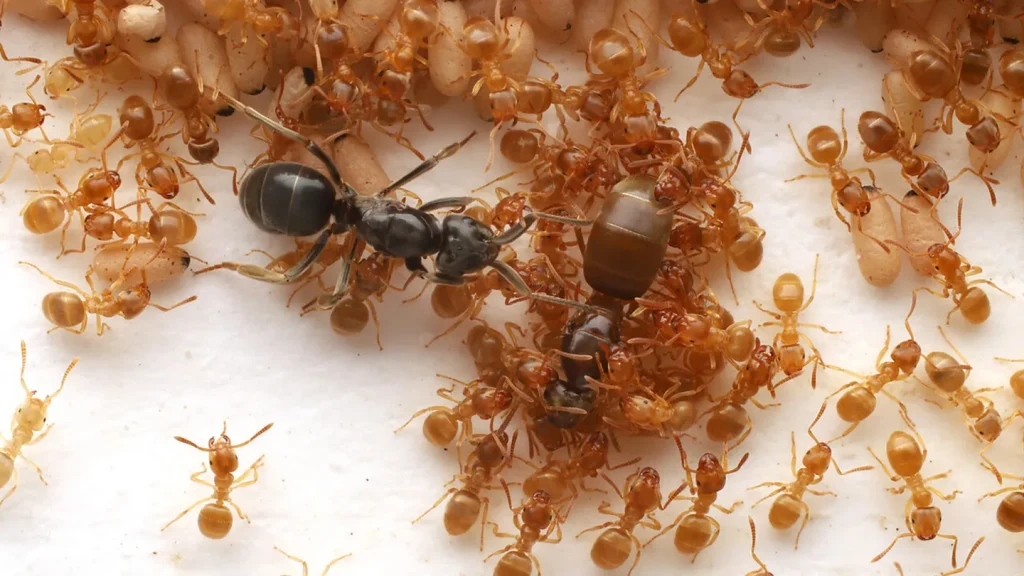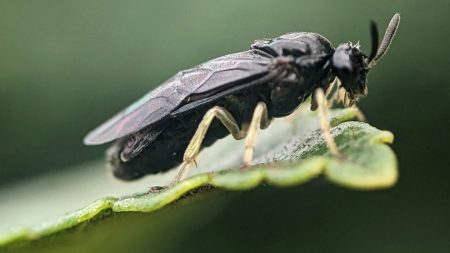The Surprising World of Ant Matricide: A Royal Coup d’état
In the complex societies of ant colonies, succession sometimes takes a dark and unexpected turn. Recent research published in Current Biology reveals a shocking strategy employed by certain ant queens to claim a throne: orchestrating matricide through manipulation. This discovery sheds light on one of nature’s most unusual power struggles, where a third party benefits from the death of a mother at the hands of her own offspring.
The study, led by Keizo Takasuka, a behavioral ecologist and entomologist at Kyushu University in Japan, documents how newly mated queens of Lasius orientalis and L. umbratus species infiltrate established colonies of related ant species and trigger a violent overthrow of the resident queen. “This is, to our knowledge, the first case where a third party benefits from matricide,” explains Takasuka, highlighting the uniqueness of this behavior in the natural world. Matricide is exceptionally rare in nature, likely because maternal bonds typically serve crucial survival functions. The few documented cases mostly occur among invertebrates, usually involving mother sacrifice for offspring nutrition or workers eliminating queens to shift colony reproduction patterns.
The researchers created tabletop colonies in small containers connected to feeding stations to observe this remarkable behavior. The parasitic queen’s strategy follows a sophisticated sequence: first, she spends time among the worker ants, acquiring their colony scent to disguise herself as one of them. Once accepted, she approaches the resident queen and sprays her with a chemical substance that provokes a dramatic response from the worker ants. This chemical attack transforms loyal subjects into revolutionaries who violently turn against their own mother queen. Analysis suggests the spray likely contains formic acid, a common defensive chemical among ants, though Takasuka notes further testing with synthetic formic acid would help confirm whether this chemical alone triggers the matricide or if other compounds are involved.
The process of overthrowing the resident queen varies in duration and intensity. In one observed case, a Lasius umbratus queen needed only two sprays to incite workers to kill their L. japonicus queen within half a day. In contrast, another scenario involved a L. orientalis queen spraying her L. flavus victim 16 times over 20 hours, with workers ultimately killing and dismembering their mother after four days of sustained attacks. This variation suggests flexibility in the strategy, perhaps adapting to the strength of colony cohesion or the resident queen’s status.
What makes this behavior particularly fascinating is how it differs from typical parasitic ant strategies. Christine Johnson, a behavioral ecologist at the American Museum of Natural History not involved with the research, notes that most parasitic ants directly kill the resident queen themselves. By manipulating workers to commit matricide, the invading queen significantly reduces her personal risk of injury or death during the takeover attempt. This approach represents a remarkable evolutionary adaptation for throne usurpation with minimal danger to the usurper.
However, the researchers caution that successfully eliminating the resident queen doesn’t guarantee the parasitic queen’s acceptance as the new ruler. While workers may kill their mother under chemical manipulation, they don’t automatically transfer their allegiance to the newcomer. As Johnson observes, “She can be accepted, but it doesn’t necessarily mean they’re going to adopt her young.” This uncertainty highlights the complex social dynamics at play in ant colonies, where recognition systems and allegiance mechanisms extend beyond simple chemical manipulation.
This discovery opens fascinating questions about the evolution of social parasitism and the chemical communication systems that govern ant societies. It demonstrates how natural selection can produce extraordinary behavioral strategies, even those that seem to violate the fundamental bonds between mothers and offspring. The research not only advances our understanding of ant behavior but also provides insights into the broader evolutionary principles that shape social interactions across species, reminding us that nature’s ingenuity often surpasses our expectations in surprising and sometimes unsettling ways.














